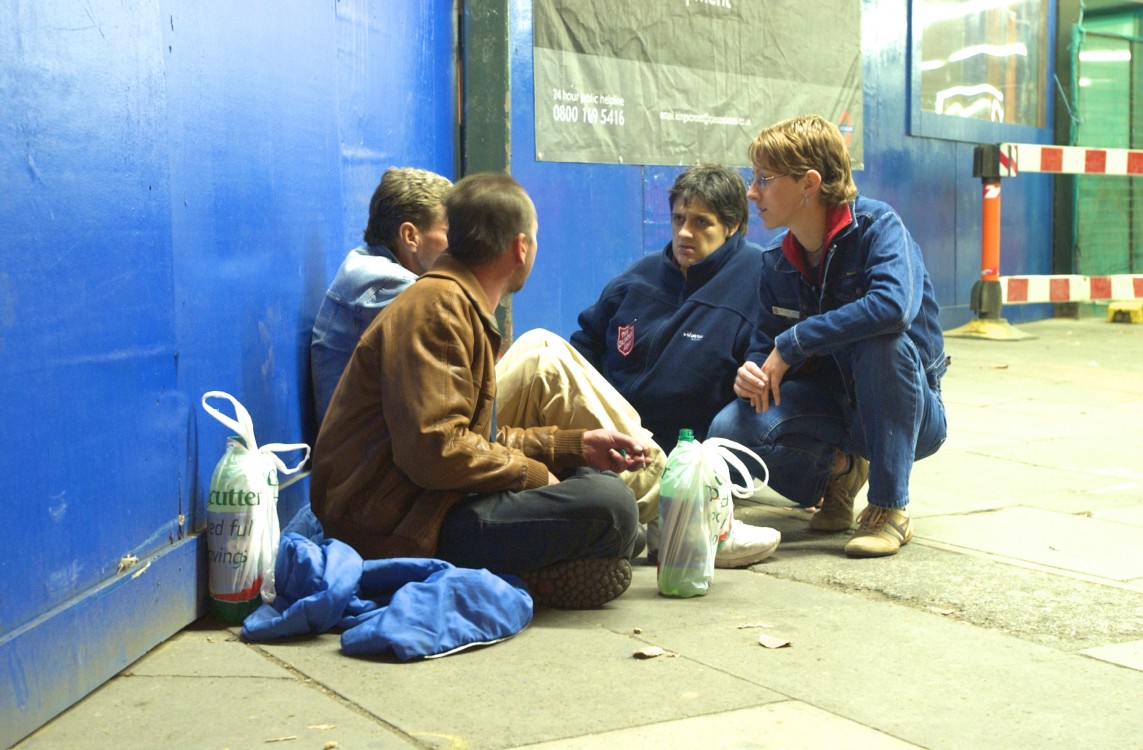
There has been a surge in homelessness among young people in the U.K., as the real number of homeless exceeds the government's "official figures" by three times, according to a recent study by Cambridge University.
Cambridge's Centre for Housing and Planning Research found that during 2013-14, 83,000 young people had to rely on councils and charities for shelter, significantly exceeding the figure of 26,852 recorded by the Department for Communities and Local Government.
The research, conducted by the homeless charity for young people, Centrepoint, drew on official data taken from a national survey of 16- to 25-year-olds, from 40 local authorities. The study has been cited as the most “comprehensive picture of youth homelessness to date.”
The survey also revealed that the availability of data on homelessness among young people has decreased since 2009, and discussed the rise of what has been called "sofa surfing." With nowhere else to stay, 35 percent of the 2,011 youngsters who participated in the survey admitted to having sofa surfed at some point, on friends’ sofas or in cars, tents or open spaces.
The findings of the research showed that "the number of young people experiencing homelessness or failing to access the housing they need is much higher than official figures suggest."
The reason the official data grossly underestimated the extent of youth homelessness in the U.K. is because the statistics were based on a narrow definition of what equates as homelessness among young people.
For example, the only groups of people that local authorities have a duty to house in Britain are those who are under 18, have left other forms of care, or who are pregnant. Consequently, a vast majority of youngsters over the age of 18 who are homeless in the U.K. are omitted from official government statistics.
So what are the real reasons for the surge of youth homelessness in Britain?
A Shortage of Affordable Housing
For starters, the shortage of affordable housing has been described as a key driver of UK youth homelessness. As researchers of a recently published report by the Joseph Rowntree Foundation found: “The continuing shortfall of levels of new house building relative to levels of household formation is a prime structural contributor to homelessness and other forms of acute housing need.”
Recent homelessness activity in Bristol, Britain’s sixth most populous city, is a stark example of the rising crisis of youngsters sleeping rough. Last month, a local Bristol authority revealed that the number of homeless families in the city has trebled during the last year.
According to the report, four years ago the number of families in Bristol requiring emergency accommodation was zero. In 2014, that figure had risen to 40. By July of 2015 it had surged to 140.
Bristol’s rising homelessness has been pinned to the £91 million in cuts forced on the city by its millionaire Mayor George Ferguson during the last three years. The report also placed blame on “the shortage of affordable housing in Bristol, rising rents in the private rental market and welfare reform.”
The problems created by the shortage of affordable housing here and across Britain can be traced to the 1970s when the Conservative government abandoned the construction of council houses and stopped subsidizing social housing tenants in favor of enriching landlords and banks.
This policy continued into the 80s when Margaret Thatcher’s Conservative government introduced a “Right to Buy” scheme, which enabled council housing tenants to buy their council houses – resulting in what has been referred to as the “largest every privatization of public assets.”
Britain's current Conservative government claims to be reforming what it has deceptively called “affordable housing.” But in reality, many argue the new program makes it easier for housing developers to opt out of creating a small percentage of housing dedicated to lower rent in their schemes.
Extending the “Right to Buy” scheme to housing association tenants will be subsidized under the current plan by “forcing councils to sell ‘high value’ homes, speeding up rent rises, social cleansing and the gentrification of Britain’s cities,” according to the World Socialistwebsite.
Apart from the "gentrification of social housing," Conservatives’ incessant hacking of the welfare state, targeted especially at young people, is playing a harmful role in rising youth homelessness.
As Occupy.com previously reported, in the Government’s 2015 Budget announced last month, Britain’s young people fared particularly badly, with the Chancellor of the Exchequer George Osborne scrapping housing benefits for the under 21s, removing Jobseeker’s allowance from youngsters, slashing tax credits and ensuring the new minimum wage does not apply to the under 25s.
Such severe cuts have been described as making a rise in homelessness “inevitable” throughout the whole of Britain.
In 2012, Prime Minister David Cameron claimed to justify removing housing benefit for the under 25s by announcing that there were many housing benefits claimants who would have a parental home and somewhere to stay but they “just want more independence.”
The same year, Osborne revived plans to remove housing benefit for the under 25s, asking at a Conservative Party conference, “Is it right that school leavers should be able to move directly from school to a life on housing benefit without finding a job first?”
The Tories’ assumption that many young housing benefit claimants have a perfectly good parental home to move into, and are merely claiming housing benefits in order to “be independent,” is contradicted by the recent findings of the Cambridge University study.
According to the most comprehensive study on youth homelessness in the U.K. to date, the most common reason reported for homelessness and "sofa surfing" is due to parents being either unable or unwilling to house the young person, or an unsafe home environment.
The only way Britain is going to start resolving its rise in youth homelessness is if it starts to acknowledge actual figures instead of grossly deflated ones, builds the type of affordable housing the country desperately needs – and if policymakers lose the attitude that young people can simply live at home with their parents as a means of abolishing their right to welfare benefits.
3 WAYS TO SHOW YOUR SUPPORT
- Log in to post comments












